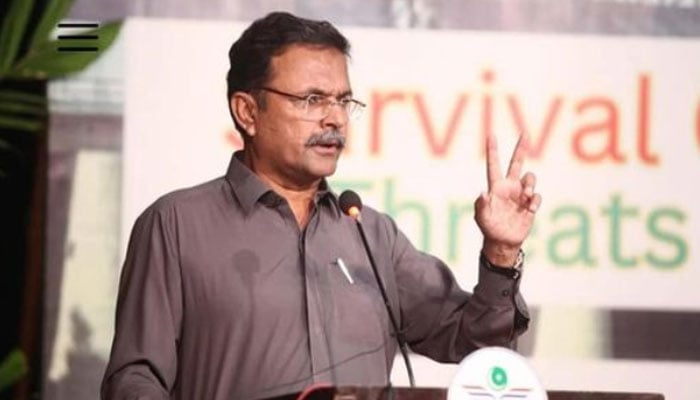‘Cholistan canal plan a conspiracy to drain away Sindh’s limited water resources’
A seminar organized by the Sindh United Thinkers Forum was held in Karachi to protest against the federal government’s proposed plan to construct six canals from the Indus River, a project that speakers argued would worsen the water crisis in Sindh.
The seminar took place recently at the Pakistan-American Cultural Center and was attended by key political figures, scholars, and activists. Among the prominent speakers were Syed Zain Shah, central president of the Sindh United Party (SUP), senior lawyer Shahabuddin Osto, writers Naseer Memon, Hussain Bakhsh Thebo, Inam Sheikh, and Professor Saleem Memon.
The main focus of the seminar was on the federal government’s decision to allocate a budget of Rs200 billion for the construction of canals in Cholistan. The participants condemned this move, which they argued would deepen the already dire water shortage in Sindh, a province that relies totally on the waters of the Indus River.
Speakers at the seminar criticized the federal government for not adhering to the 1991 Water Accord, an agreement meant to ensure equitable distribution of water between Sindh and other provinces. The proposed canal scheme, they claimed, is a conspiracy to drain Sindh of its already limited water resources.
The leaders warned that the construction of the new canals, including the Cholistan and Greater Cholistan canals, could divert water away from Sindh and lead to the cultivation of 40,000 to 50,000 acres of land in Punjab. This, they said, would have devastating consequences for Sindh, potentially transforming the province into a desert and exacerbating the existing water scarcity.
Syed Zain Shah, speaking at the event, emphasized the severe impact the canal project would have on Sindh’s agricultural land and economy. “This decision will create a severe water crisis in Sindh,” he said. “The land will turn barren, and this will lead to an economic and humanitarian disaster.”
He also highlighted concerns about the potential repercussions for other provinces, particularly Balochistan, which could also suffer from a reduction in water supplies. “This decision will lead to a tug of war between provinces over water resources,” Shah warned.
Furthermore, Shah expressed strong disapproval of the way the decision was made, asserting that the federal government bypassed legitimate forums and stakeholders in Sindh. “The Pakistan Peoples Party (PPP) also supports the Federation in this process, and we condemn this decision,” he said. “We consider it not only illegal but also anti-Sindh. The people of Sindh will protest against this injustice.”
The seminar concluded with a call for solidarity among Sindh’s political and civil society groups to resist the proposed canal project, which they view as a violation of the rights of the people of Sindh. Protest actions are being planned to voice opposition to the federal government’s scheme.
-
 Bombshell Reason Behind Cardi B, Stefon Diggs' Breakup Revealed
Bombshell Reason Behind Cardi B, Stefon Diggs' Breakup Revealed -
 Hilary Duff Details How She Protected Her Children’s Mental Health Amid Divorce
Hilary Duff Details How She Protected Her Children’s Mental Health Amid Divorce -
 'The Masked Singer's Snow Cone's Identity Revealed
'The Masked Singer's Snow Cone's Identity Revealed -
 Kash Patel Fires FBI Officials Behind Trump Mar-a-Lago Documents Probe, Reports Say
Kash Patel Fires FBI Officials Behind Trump Mar-a-Lago Documents Probe, Reports Say -
 Martin Short's Daughter Katherine's Death Takes Shocking Turn As Terrific Details Emerge
Martin Short's Daughter Katherine's Death Takes Shocking Turn As Terrific Details Emerge -
 Jeff Galloway, Olympian, Author, Running Legend, Dead At 80
Jeff Galloway, Olympian, Author, Running Legend, Dead At 80 -
 Patrick Dempsey Reacts To Tragic Death Of His 'Grey's Anatomy' Co-star Eric Dane
Patrick Dempsey Reacts To Tragic Death Of His 'Grey's Anatomy' Co-star Eric Dane -
 Sidney Crosby Injury News Shakes Penguins After Olympic Tournament
Sidney Crosby Injury News Shakes Penguins After Olympic Tournament -
 Yankees Honour CC Sabathia With No. 52 Retirement This September
Yankees Honour CC Sabathia With No. 52 Retirement This September -
 Cuban Government Says Boat Full Of Armed Men Fired On Border Guards, Killing 4
Cuban Government Says Boat Full Of Armed Men Fired On Border Guards, Killing 4 -
 Lily Collins Faces Intense Pressure After Landing Audrey Hepburn Role: Source
Lily Collins Faces Intense Pressure After Landing Audrey Hepburn Role: Source -
 FIFA World Cup Security Concerns Spike After Recent Cartel Violence In Mexico
FIFA World Cup Security Concerns Spike After Recent Cartel Violence In Mexico -
 Shamed Andrew Ordered To Curb Hobby: ‘It’s A Bad Look’
Shamed Andrew Ordered To Curb Hobby: ‘It’s A Bad Look’ -
 Cardi B 'no-nonsense' Move: Why She Distanced Herself From Stefon Diggs? Source
Cardi B 'no-nonsense' Move: Why She Distanced Herself From Stefon Diggs? Source -
 Metallica Announce 2026 ‘Life Burns Faster’ Las Vegas Sphere Residency
Metallica Announce 2026 ‘Life Burns Faster’ Las Vegas Sphere Residency -
 ‘From Dating Scams To Fake Lawyers’: OpenAI Bans ChatGPT Accounts Over Misuse
‘From Dating Scams To Fake Lawyers’: OpenAI Bans ChatGPT Accounts Over Misuse




